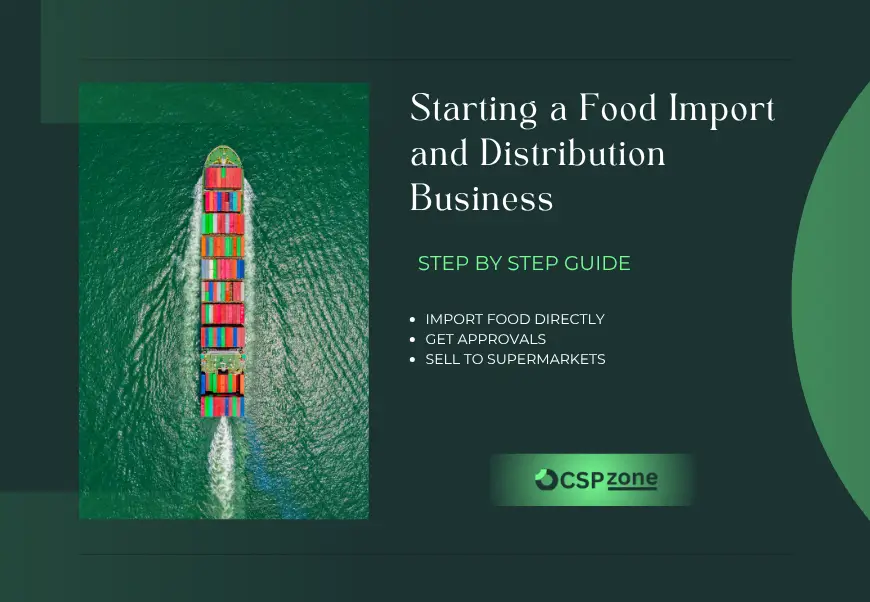


Dubai imports over 90 percent of its food supply, and almost all of it is consumed within the UAE. With a fast-growing population, more than 200 nationalities, and one of the highest restaurant-to-population ratios in the world, demand for imported food is increasing every year. The local market relies on consistent supply, from fresh fruits and vegetables to specialty meats, dairy, packaged snacks, and beverages.
If you are looking to import food into Dubai and sell it directly in the UAE, the opportunity is real. The market rewards reliable suppliers who meet strict regulatory requirements and can deliver products consistently to supermarkets, hotels, restaurants, and online platforms.
Dubai’s residents are diverse, with each community seeking foods from their home countries. The hospitality sector is expanding rapidly, and supermarkets constantly introduce new brands to meet changing consumer tastes. Categories with growing demand include:
- Fresh and frozen seafood
- Premium and specialty meats
- Organic and health-focused products
- Ethnic grocery items for Indian, Filipino, African, and European communities
- Gourmet snacks and beverages
In this business, the focus is not just on finding a product, but on building a reliable supply chain that ensures availability in the local market year-round.
Food is one of the most strictly regulated imports in the UAE. Every importer must be approved by Dubai Municipality’s Food Safety Department before goods are shipped.
1. Registering your company as a food importer in the Food Import and Re-export System (FIRS).
2. Registering every product (each SKU) in the system before import.
3. Ensuring labels are in both Arabic and English with clear expiry date, ingredients, nutritional values, storage instructions, and country of origin.
4. Obtaining special permits for categories like meat, poultry, dairy, or baby food.
5. Shipments are checked on arrival. Non-compliant labels, unapproved ingredients, or banned items can lead to delays or rejections.
If your goal is to sell in Dubai’s local market, a mainland trade license is essential.
1. Import food directly into Dubai without using an intermediary.
2. Sell to supermarkets, wholesalers, restaurants, hotels, and online platforms in the UAE.
3. Distribute products anywhere in the country without additional permissions.
A free zone license is not recommended for this model because you would need a mainland importer to clear your goods and bring them into the local market, adding unnecessary cost and dependency.
To legally import and sell food in Dubai, you will need:
1. Trade license from the Department of Economy and Tourism (activity: Foodstuff Trading).
2. Registration in FIRS with Dubai Municipality.
3. Product registration and label approval for every SKU before shipping.
4. Special approvals for meat, poultry, dairy, or other regulated products.
5. HACCP certification if you handle, store, or transport food.
For perishable items, cold chain storage is mandatory. Dubai has multiple temperature-controlled warehouses in Al Quoz, Dubai Industrial City, and near Jebel Ali Port. Costs start from around AED 35 per pallet per month depending on the facility and temperature range.
Shipments are cleared through the E-Mirsal 2 customs system.
1. Dry goods usually clear within one to two days.
2. Chilled and frozen items may take three to five days due to inspections.
Import duty is typically 5 percent, and VAT at 5 percent applies when selling in the mainland market.
Select your product category based on market demand.
1. Choose a mainland company setup with the correct activity.
2. Obtain your trade license.
3. Register as a food importer in FIRS.
4. Complete product and label registration before shipment.
5. Arrange compliant storage (cold or dry, as needed).
6. Ship goods and complete customs clearance.
Finding Buyers in the Local Market
The UAE market offers multiple buyer categories:
1. Supermarkets and hypermarkets such as Carrefour, Lulu, Spinneys, Union Coop.
2. Hotels, restaurants, and catering companies that require regular bulk supply.
3. Online grocery platforms like Instashop, Noon, and Talabat Mart for specialty and fast-moving products.
Each channel has its own requirements for supplier registration, quality checks, and in some cases, listing fees. Building long-term relationships and proving consistent quality is key.
CSPzone Consultant specialises in helping entrepreneurs and established traders set up food import operations in Dubai for local market sales. We assist with:
1. Structuring your mainland company for direct import and distribution.
2. Managing all Dubai Municipality and customs approvals.
3. Completing product registration and label compliance.
4. Connecting you with supermarket procurement teams and horeca buyers.
5. Guiding you on storage, transportation, and logistics for consistent supply.
With our expertise, you can enter the market faster, avoid costly mistakes, and focus on building your brand in the UAE. Contact us today for free consultation.